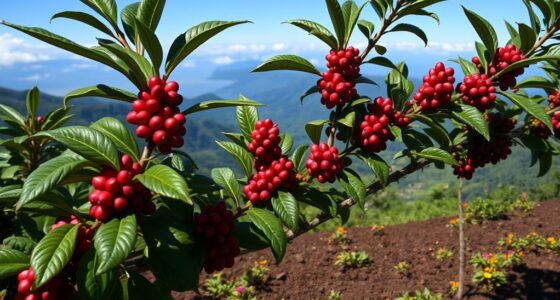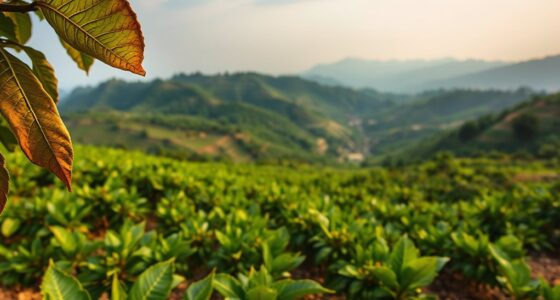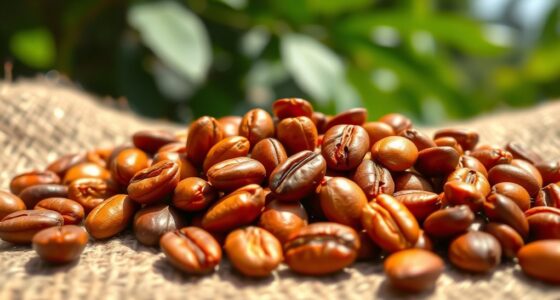Yemeni coffee offers an exotic, spicy experience you won’t forget. You’ll notice earthy, complex flavors with hints of dried fruit and chocolate, complemented by warming spices like cinnamon and cardamom. The coffee is grown on high-altitude terraces using traditional methods that preserve its rich aroma and unique irregular appearance. Its rarity and cultural significance make it a premium choice. If you want to discover more about this remarkable brew, keep exploring its fascinating history and crafting process.
Key Takeaways
- Yemeni coffee features an earthy, complex flavor with dried fruit, chocolate notes, and a spicy blend of cinnamon and cardamom.
- Cultivated at high altitudes using traditional, manual methods, preserving unique flavors and authenticity.
- Sun-dried beans with irregular shapes reflect craftsmanship and ancient farming practices.
- Recognized as a premium, scarce coffee with prices from $60 to $240 per pound.
- Rich in cultural heritage, each cup embodies centuries-old traditions and Yemeni agricultural history.

Have you ever wondered what makes Yemeni coffee so unique? It’s the rich history, but more so the captivating flavor profile that sets it apart. Yemeni coffee, made from carefully selected coffee beans, offers an earthy, complex taste that invites you to explore its depth with every sip. The flavor profile often features notes of dried fruit, complemented by hints of chocolate and a spice blend that includes cinnamon and cardamom, making each cup an exotic and spicy journey. This coffee isn’t just about taste—it’s about experiencing a centuries-old tradition rooted in the rugged terrains of Yemen. The traditional cultivation plays a vital role in shaping Yemeni coffee’s distinctive character. Farmers harvest the cherries through hand-picking, a meticulous process that guarantees only the ripest fruit is selected. These cherries grow on high-altitude mountain terraces that reach over 8,000 feet, where the cool climate and mineral-rich soil contribute to the coffee’s unique qualities. This ancient farming technique preserves the integrity of each coffee cherry, allowing the beans to develop their full aroma and flavor. The sun-drying methods used in Yemen are equally traditional, often involving sun-drying the beans on mats or terraces, which adds to the irregular shapes of the coffee beans—an indication of their manual processing. These irregularities, far from being flaws, are a mark of authenticity that many connoisseurs seek. Because of the traditional cultivation methods and the high-altitude environment, Yemeni coffee has become a highly prized commodity on the global market. It’s considered premium coffee, with prices that can range from $60 to $240 per pound depending on quality and scarcity. Many people appreciate not just the flavor but the entire coffee experience—knowing that each cup is a product of ancient farming techniques and the region’s rugged landscape. When you brew Yemeni coffee, you’re engaging with a rich history that spans centuries, connecting you to the land and the farmers who’ve cultivated it through generations. In essence, Yemeni coffee offers more than just a caffeine boost; it provides an immersive sensory experience. From the hand-picked coffee beans to the earthy aroma and spicy taste notes, every step in its production preserves a tradition that continues today. This is premium coffee that’s as much about history and culture as it’s about flavor. When you savor Yemeni coffee, you’re tasting a piece of Yemen’s soul, crafted through centuries of dedication and ancient farming techniques.
Frequently Asked Questions
What Is Special About Yemeni Coffee?
You’re curious about what makes Yemeni coffee special. It’s the rich, complex flavors you’ll notice first—earthy, fruity, and spicy notes like cinnamon and cardamom.
Grown in high-altitude terraces using traditional methods, it offers a bold, full-bodied experience.
Its deep cultural history and rarity add to its allure, making it a premium, authentic choice for coffee lovers who seek a unique, exotic sip.
Why Is Yemen Coffee so Expensive?
You might wonder why Yemeni coffee costs so much. Its high price comes from limited production, traditional high-altitude cultivation, and labor-intensive hand-picking.
Political unrest disrupts supply chains, making it scarcer and pricier.
Plus, the unique earthy, aromatic, and complex flavors appeal to connoisseurs, boosting demand.
Strict export laws and rarity also mean fewer beans reach the market, driving up costs and making it a true luxury for coffee lovers.
What Spices Are in Yemeni Coffee?
You’re curious about the spices in Yemeni coffee. It typically includes cardamom, cinnamon, cloves, and ginger.
Cardamom is the most prominent, giving a warm, citrusy flavor. Cinnamon adds a sweet, woody note, while cloves bring a pungent aroma. Ginger offers subtle spiciness that balances the blend.
These spices combine to create a rich, aromatic, and complex taste experience that’s truly unique.
What Is the Most Expensive Yemen Coffee?
You’re curious about the most expensive Yemen coffee. It’s typically the rare, high-quality varieties from regions like Mokha or Haraz, fetching up to $240 per pound.
Limited supply, traditional farming methods, and political instability keep prices high. These premium beans are often sold through specialty exporters or auctioned at international markets, making them highly sought after for their unique flavor profiles and exclusivity.
Conclusion
So, next time you sip Yemeni coffee, remember its rich history, bold spices, and unique flavor. Let each cup transport you to the ancient markets of Yemen, where tradition and craftsmanship blend seamlessly. Embrace the exotic and spicy notes that make this coffee truly special. Whether you’re a seasoned connoisseur or a curious newcomer, Yemeni coffee offers a memorable experience worth savoring. Enjoy every sip and appreciate the culture behind this remarkable brew.









